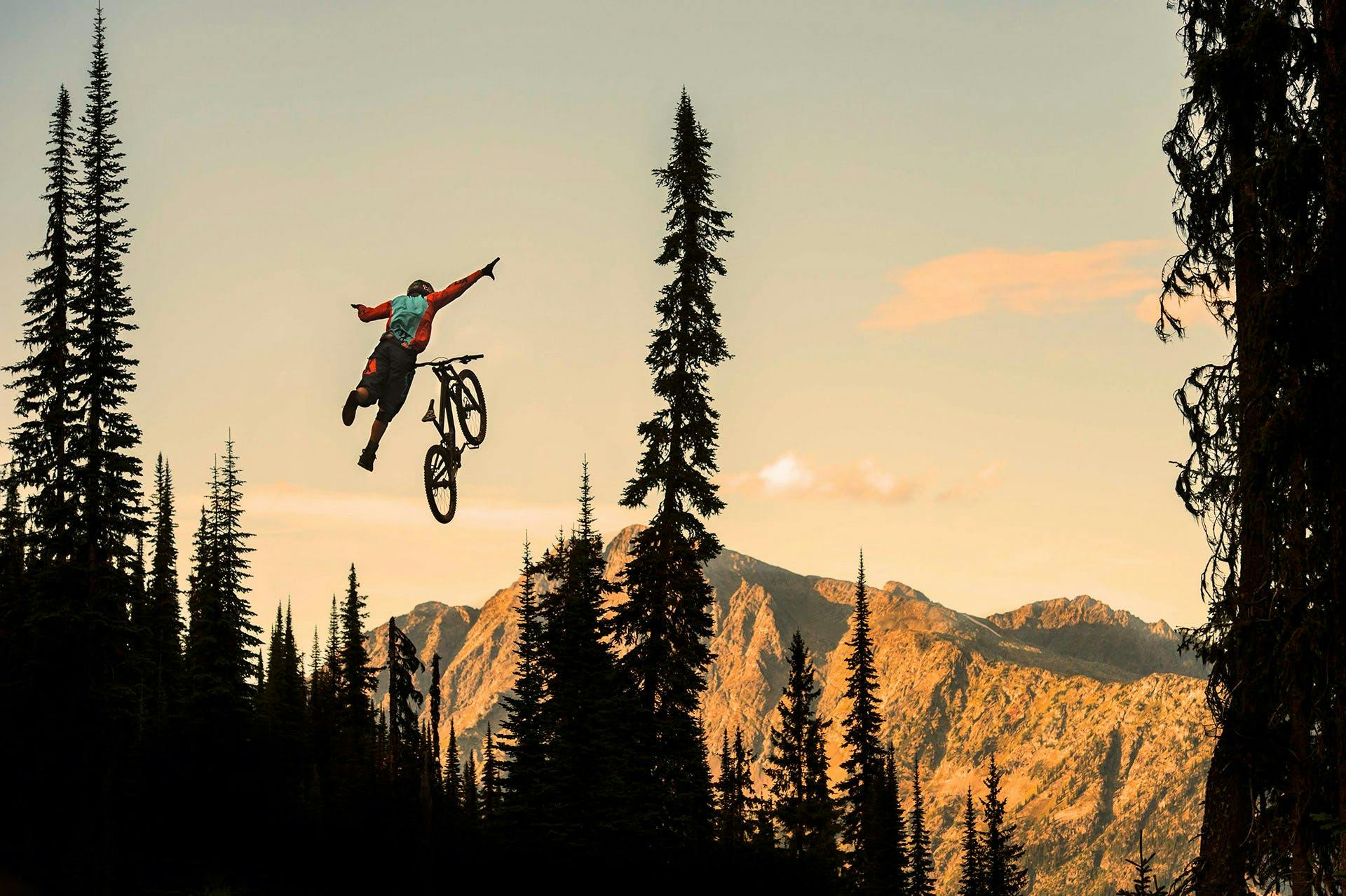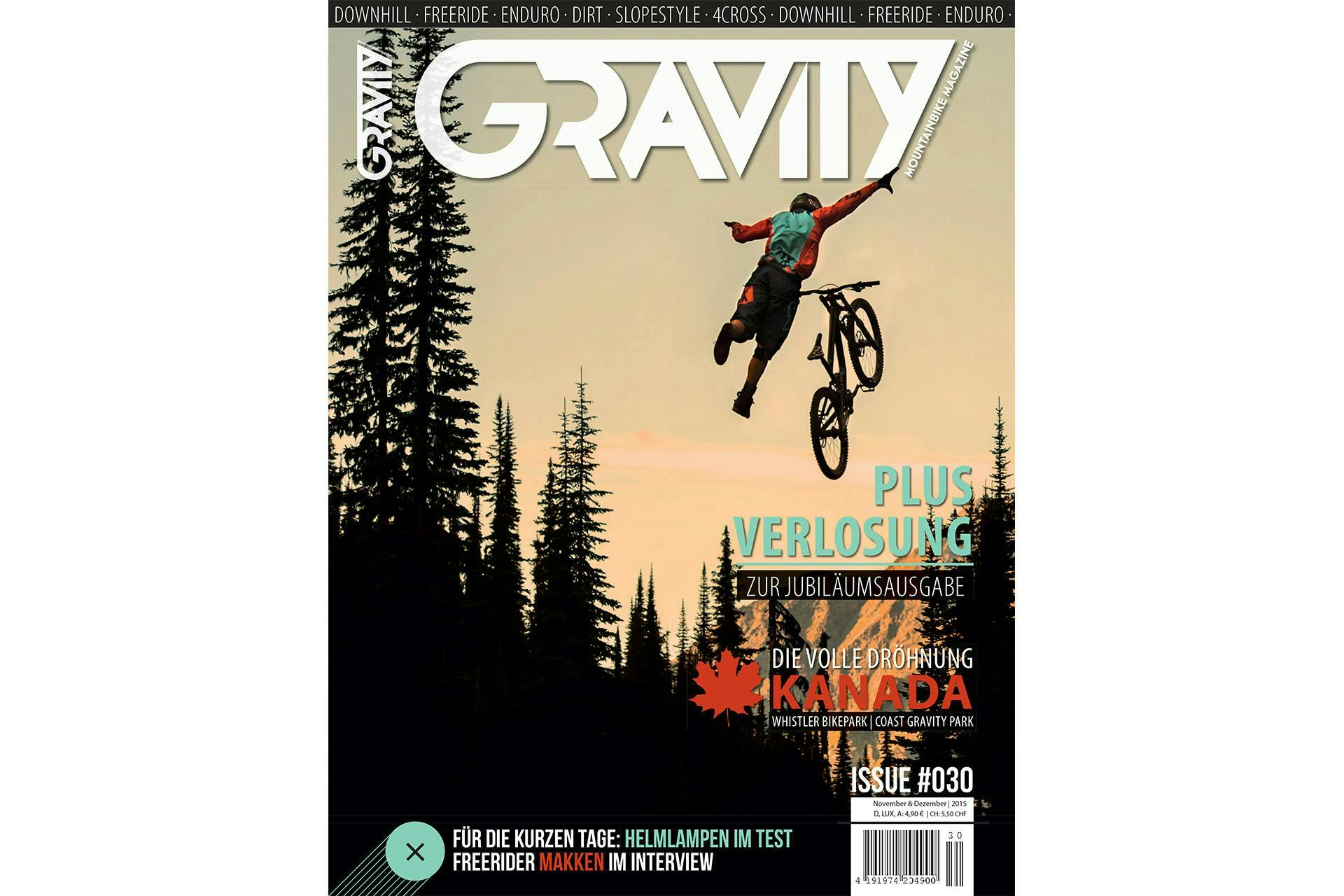The Story Behing The Shot: The Fest Flintstone
Words: Pete Harrington
Photos: Lisa Paarvio
It had been a long day on the mountain. Most of the riders had landed their last runs and were weaving back to their trucks, eager for post-ride beers and barbecue. “That was when Sam Reynolds came over,” remembers photographer Lisa Paarvio. “He asked me, ‘Are you going to shoot? I’m going to do some more runs.’” Turning to look down the course, Lisa saw that the others had almost made it back and would soon be packing their bikes away.
“There was this amazing feeling of stillness; a pause before the lengthening shadows slipped over the mountains,” she says of that final session of the 2015 Fest series at Retallack Lodge in B.C Canada, named Hoff Fest in honour of organiser Kurt ‘The Hoff’ Sorge. “I wanted to shoot some more, so I told Sam yes, and asked him which jump he’d like me to cover.”
Founded by Mads Haugen (RedBull, Norway), Andreu Lacondeguy (Redbull Spain), Kurt Sorge (Rockstar, Canada), Graham Agassiz (Monster Energy, Canada), and Nico Vink (Belgium), the Fest series is a rider-made, formerly private event, free of judges, sponsors, points and once, commercialism. It started with a simple idea: to bring likeminded freeriders together to build new lines, shred huge jumps and rediscover the purest essence of the sport away from the media and industry glare.
Stationed at the final jump at Sam’s request, Lisa waited to capture what she expected to be a familiar sequence of tricks. But this time it was different. “There wasn’t any light on the course,” she remembers. “My only option was to capture whatever Sam was going to do in silhouette, using the still sunlit mountains in the distance as my backdrop.
“So I waited, saw Sam do a nice jump on the one before mine – good height, a little side turn, nothing fancy – and turned to the jump ahead, raising my camera to where I knew he would most likely position on the ramp. As I tracked him into the air and started to squeeze the shutter, for the first time that week, without telling anyone, he pulled the Flintstone.” For anyone not familiar with freeriding terminology, that, as Lisa’s outwardly calm, beautifully composed shot shows, is something like a Superman minus contact with the bike. In other words, total freefall. But why did Sam wait until the dying moments of the final day to perform arguably the week’s most impressive move? “Sometimes riders have things in mind that they feel like doing, but they’re waiting for the right point,” she says. “And sometimes you have a lot of people watching, pressure, and for whatever reason, it’s not the right time and they just don’t feel it.” Back at the cars, the other riders huddled around Lisa’s camera to see the shot. “They were all like, ‘What the f*ck? Really?’ she laughs. “Less than a month later, that shot became my very first mountain bike magazine cover when Gravity Magazine used it for their November edition.”

Taught to shoot without flash during her years studying and practising photography in her native Germany, Lisa relied on timeworn techniques to capture Sam’s jump. “I always try to imagine the scene before I take the shot. You have to try to understand what you want and then aim to get as close as possible to that vision with the settings on the camera,” she explains. “For example, I may have to decide if I want information in the foreground, or only in the background. For my shot of Sam, I knew that he would be jumping jump more or less straight away from me, working the same line I had seen him take all week. So I put my autofocus on and pushed the button slightly to start measuring. Once I saw him take off on the lift, I let the camera fire multiple shots. Normally I prefer to take one shot, but because I didn’t know which trick he was going to do, I wanted to cover all my bases. The shutter speed was also on my mind, so I set it to about 1/1600 in order to guarantee a blur-free photo.”
But if the angle isn’t right, Lisa advocates upping sticks and shifting perspective. “If it’s not working where you’re sat, move – don’t rely on your zoom. When I was shooting interior architecture early in my career, it was a pain in the ass because the rooms were so tight with very little space and you have to shoot on a tripod which takes away your flexibility. And you can’t cheat too much either, because the more wide angle you go, the more your lines are twisted,” she says. “But when we’re talking about sports and outdoors, you can move left, right, back, closer, up and down. Don’t be afraid to be close, but do speak to your subject first and tell them your idea. It could be dangerous if you don’t know their lines. They will tell you.”
With slim budgets, one of the hardest decision for new photographers is choosing which gear to buy, especially in a world where, like bikes, great kit is more accessible and plentiful than ever. “I’ve learned over time that it’s always way more important to spend money on a good lens than on the actual camera,” she says. “If you spend a lot of money on a very high-quality camera, but skimp on the glass, you’ll always take lower quality shots than someone who invested in a superb lens paired to a mid-range body.” But before even that, as Lisa explains, first you have to think about what you like photographing. “Are you going to capture landscapes, birds in flight or family scenes? All of those require very different lenses. So, like planning your shot, before spending on your kit, first think about what sort of photography interests you, and go from there.”
Having shot the first three Fest events, Lisa was lucky enough to capture the freewheeling excitement of the new format. But as she notes, that scene has now changed. “When I started, at some events I was shooting almost alone. But of course, it got popular very quickly. Pretty soon, more and more old-guard photographers from the mountain bike industry wanted to come. Before long, there were too many people and brands involved in all areas of the event. But for a while there, it was wonderful.”

